The scent of Seville
Travel writing vs. nature writing & following a fragrance from Italy to Spain to Morocco.
Dear Friends and Readers,
Writing as part of the Substack community continues to bring fresh delights thanks to all of you readers and writers! In the last few weeks I’ve been in conversation with a writer I met here named
. She invited me to consider myself a nature writer, which pushed me to think in new ways about my writing habits and transformative life-moments that happened outdoors. Stay tuned — she is going to share some of my responses to her thoughtful, caring interview questions on her publication, .Though I can often be found writing outside, in nature, especially this time of year, the dreamiest profession in my book must be ‘travel writer.’ As far as I’m concerned, the Pico Iyers and Dervla Murphys and Paul Thorouxs of the world have found the sweetest gig ever.
To me, nature writing and travel writing share a sense of adventure while celebrating the beauty and diversity of the world. The writers I like best in both genres are self-reflective and draw the reader in through open-hearted observation.
One of the great things about travel is how it multiplies our innate curiosity about everything, everywhere. For me, reading brings some of the same joys as wandering in real life, reminding me that every place is interesting, if I pay attention.
Travel and nature often inspire wonder and awe — universal human responses no matter where you live or what your culture! I was doing a little armchair exploring last week and learned about a celebration of spring that’s been held annually in Valencia, Spain for hundreds of years!
describe the colorful artworks created just for the Fallas festival and explain that the whole party ends with a dramatic burning of the wooden sculptures! So fun. But it was the mention of the city of Valencia that triggered a memory and piqued my senses. I was transported…Postcards from 1996
Say Valencia and I think of oranges and immediately see the round, avuncular face of a dark-skinned Spaniard sitting high in the cab of a semi. He pulled his truck over to the gravel shoulder of a narrow highway heading west from France into Italy. I’d been standing there with two young, tall, gorgeous friends, all of us giddy to be hitchhiking to the Italian Riviera.
His truck was full of Valencia oranges. We spoke French, he spoke Spanish, and the four of us barely fit across the bench seat of the cab, but we managed. As a mother of young women, I’m not condoning this method of travel, but truth is most people are kind and generous and eager to learn about each other. And we got where we were going thanks to the export value of Valencia oranges. We arrived to a rustic resort town I cannot remember by name but will never forget.
Wearing sandals, we wandered the rocky hillside among ruins built by ancient people whose names are also now lost but whose ghosts made us weep as we looked off into the impossibly blue ocean and sky. We wept because our young spirits could barely contain the rush of emotions brought on from adventure, from good fortune, and from the sense that there was still so much of the beautiful world out there to explore. We imagined we’d never forget that place, but almost three decades later, my strongest memories are of our deliberations about what portion of the remaining lira to spend on gelato, and that we made it back to France. France was home at the time, and that was life at age 21.
It’s like time travel, to get back into that semi-truck full of oranges in my mind. The memories are visceral and embodied. I am there, looking at the world through smiling eyes, feeling my lungs full of elation and freedom, smelling the salty air. The details are more like old film: a little hazy.
One memory unlocks others
At the thought of Spain, I am overwhelmed by the flowery scent of Sevilla. I swear the memory of that city lives in my nose. I was there for a few days on my way to catch a ferry and to visit a friend who was also enjoying a study-abroad year. She lived in a family home with just a single bedroom to herself. The señora of the house didn’t want any men in that bedroom. My travel companion happened to be a conspicuous tall blond named Geoff, so crashing for free on our friend’s tile floor turned out to be a dramatic escapade. The doors were wooden, the hallways dark, and the traditional southern Spanish home cool and quiet. Our secretive comings and goings were saturated with the intoxicating floral perfume of orange blossoms.
Every tree in the city must have been at the height of orgasm. No wonder señora was nervous. The air was heady and thick, but somehow also clean and powdery. The smell of Seville in spring was new, and for an impressionable young woman, unforgettable.
Unlike juicy Valencia oranges, Seville’s prized fruit is used for cooking. Today we’d look up the best places to eat and take pictures to share on social media, but I have no memory or photos of what we ate. Travel has changed, with age and with the internet. In those days, plans were loose and we figured it out as we went.
A train carried us further south to Tarifa, where we paid cash for cheap general admission tickets for the top deck of a passenger boat and sailed on, across the Straits of Gibraltar, to Africa.
An hour later, sunburned and dehydrated, I walked with my travel companions into the port of Tangiers. A man in a brown sweatsuit and few teeth emerged from the throng of eager greeters and insisted on being our guide. He called us friends in a way that was more insistent than friendly. The Lonely Planet of the 90s described Tangiers as a connection point, the place where we could purchase bus tickets to Fes. The intention had been to leave quickly. Whether it was true or not, our new guide wanted us to know there was no way to leave by bus until the evening.
Though I’d been studying at a French university and living in France, I could barely understand his African-accented language. It was obvious he wanted a job and it didn’t take long for him to wear me and my travel mates down. We fulfilled our role in this particular dynamic, and he his. We were eventually delivered to the bus station after a million zillion hot, sweaty hours traipsing through the stinky old medina.
The winding maze of Tangiers smelled like donkey shit and cooking spices and dirty fabric. It was cramped, and I felt tall and bumbling. And a bit panicked at the realization that we had no sense of how to wind ourselves back out of the souk’s maze without our guide’s help. He was making sharp turns down narrow, chaotic alleys barely wide enough for us with our bulky backpacks and the beasts of burdens clapping alongside on the cobblestones with their own overstuffed saddlebags. We had to step aside for wooden carts pushed by men whose faces were shaded by the hoods of their djellabas, their wares of fruits and fabrics piled high. There were intricate archways leading off into dark, mysterious spaces and I was incredibly disoriented. My innate sense of direction was useless here.
Remember the days before water bottles and cell phones? Barely. I just know we were lost and thirsty. The fragrant mint tea served by the shopkeepers wasn’t the calming balm it was renowned to be. Instead, pots of hot tea were a part of the slow torture of choosing something to buy so we’d be allowed to move on.
Later on that trip, in a tiny old-world perfume shop in Fes, I’d buy a small, solid chunk of something called amber but smelling to me like the orange blossoms of Seville. That cube of mysterious substance somehow still perfumes the inside of my jewelry box! Who knew a scent could carry on like that, not just in one’s memory!?
A bus deposited my friends and me at 1:30 AM in Fes, Morocco’s second largest city. Arabic music had looped for hours over the tin-can speakers of the bus and, in those dark and quiet streets, it was still ringing in my ears. It had sounded like nothing to me but wailing and had been infuriatingly mind-numbing through the long ride. We were all a bit cranky and, at that unholy hour, we tried to find the real locations of the dots on the guidebook’s black-and-white map. The only place with a light on was designed for tourists on tours more organized than our weary wandering. We were too young and too filthy, but we couldn’t find the hostel and were grateful we didn’t have to sneak in.
An 11-year-old boy named Faisal was our guide in Fes. We had accepted that a guide was in fact necessary to translate, let alone survive, a city intentionally designed to thwart and confuse strangers, outsiders, and invaders. Faisal beelined through the walled city of Fes el Bali, just recently named a UNESCO world heritage site, switching between French, English, and a little German to tell us about the Berber culture and Arabic heritage. Music, he explained, is part of everything and considered a most powerful form of spiritual expression. I tried to keep that in mind on the next long bus ride.
Faisal made a point of taking us to the exquisite Al-Karaouine mosque and university, established in the 10th century and considered the oldest continuously operating educational institution in the entire world. Like the best guides anywhere, Faisal knew and loved his city. We would have followed that knowledgeable kid anywhere. Through lanes lined with small, organized shops where women were hunched over looms weaving rugs and men were tapping metal pots with hand tools. Into a little restaurant with oilcloth tablecloths and oily lamb stew. When the call to prayer came — a profession of faith sung from the minaret of every mosque — I wondered if Faisal would pause our tour. He did not.
I’d also worried about why Faisal was giving tours instead of attending school, but we were lucky to have him. In a ‘pharmacy,’ he translated the names of the scented oils lined up in glass jars and doled out by a wizard-like man in a long robe. Of course, he knew what was next on our tour and I believe he also knew that his tip depended on offering a layer of protection. At his suggestion, I bought a small block of scented resin, which is a traditional handmade Moroccan perfume. Following his example, I tucked the amber into the sleeve of the thin cotton shirt I was wearing to keep the sun off my arms.
The assault of the tanneries was mitigated only slightly by keeping my nose tucked into my wrist. Leather goods from Morocco are beloved around the world, and the craftsmanship is renowned, but the tanneries themselves were like a horror show. Faisal surely sensed our discomfort among the shirtless and barefoot men laboring under the direct sun among piles of hooves and skulls and entrails. I’m pretty sure we were not his first tourists to hold our breath and avert our eyes. He moved us quickly along the narrow paths between the vats.
There is always more to the story. Yes, I eventually bought a beautiful rug that I had no intention of buying. We all did. But at the end of the day, we bid Faisal goodbye with hugs and well wishes. I hope we tipped him well enough. I am sure I had no idea how to handle the exchange, but lucky for us, he was an 11-year-old expert.
Then there was another night bus rattling with Arabic music that expelled us, weary and ever more ragged, into the central square of old Marrakech, Jemma el Fna. The oasis in the desert was drenched in a pre-dawn glow, then the orb of the sun rose over the Atlas Mountains and everything turned orange.
At that early hour, the snakes were still coiled in their baskets, their charmers asleep on mats nearby. There was a cart piled with a pyramid of citrus and scrappy monkeys dragging leashes, or sitting on their haunches like toddlers, nibbling on orange peels. It was a scene from a dream or a movie or a day like any other day, unfolding continuously since the eleventh century.
I was sitting on my backpack in that hazy morning light, sucking fresh-squeezed orange juice from a plastic bag, when a very small boy appeared at my feet. He held a wooden box and gestured at my dusty brown boots. I nodded and he proceeded to ‘shine’ my shoes with something that was not shoe polish. His hands were tiny and he was intent on the task. Whatever that mysterious substance was, it turned my everyday Italian leather boots a bright orange color that never faded. Seems fitting, now that I think of it.
Thanks for reading! All photos of Morocco were taken by me in 1996. The top picture is of the amber chunk of perfume I bought at a pharmacy in Fes, still smelling good all these years later.
If you want to keep wandering, I recommend the travel writing here on Substack! Check out The Global Jigsaw,
and !Thanks so much for being here. I appreciate all your comments and support!

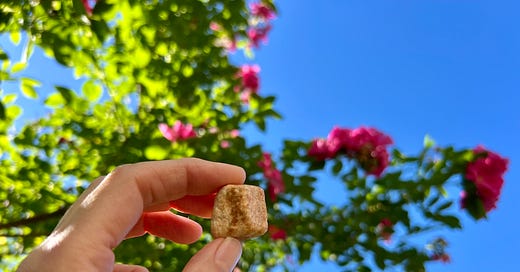



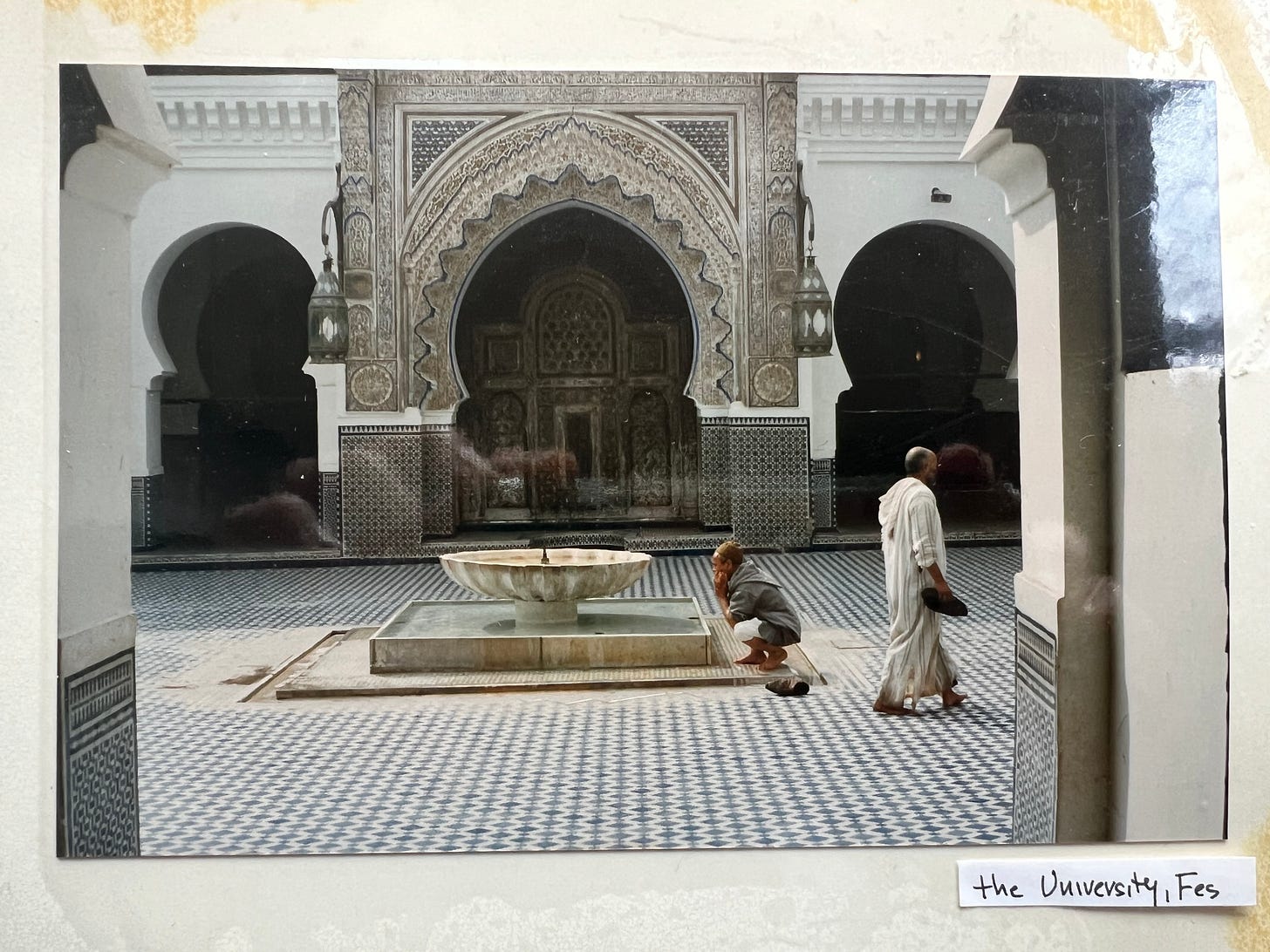
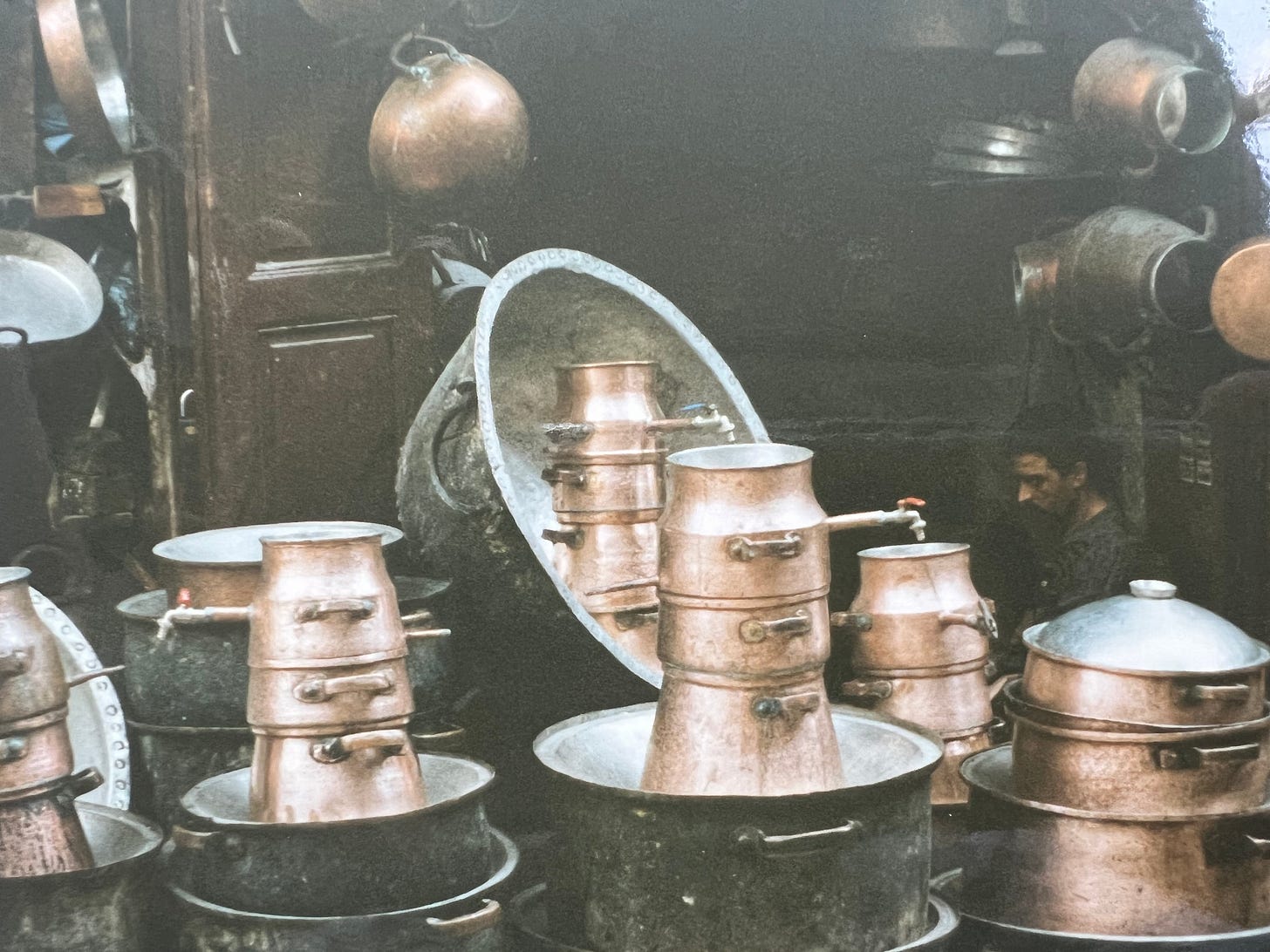
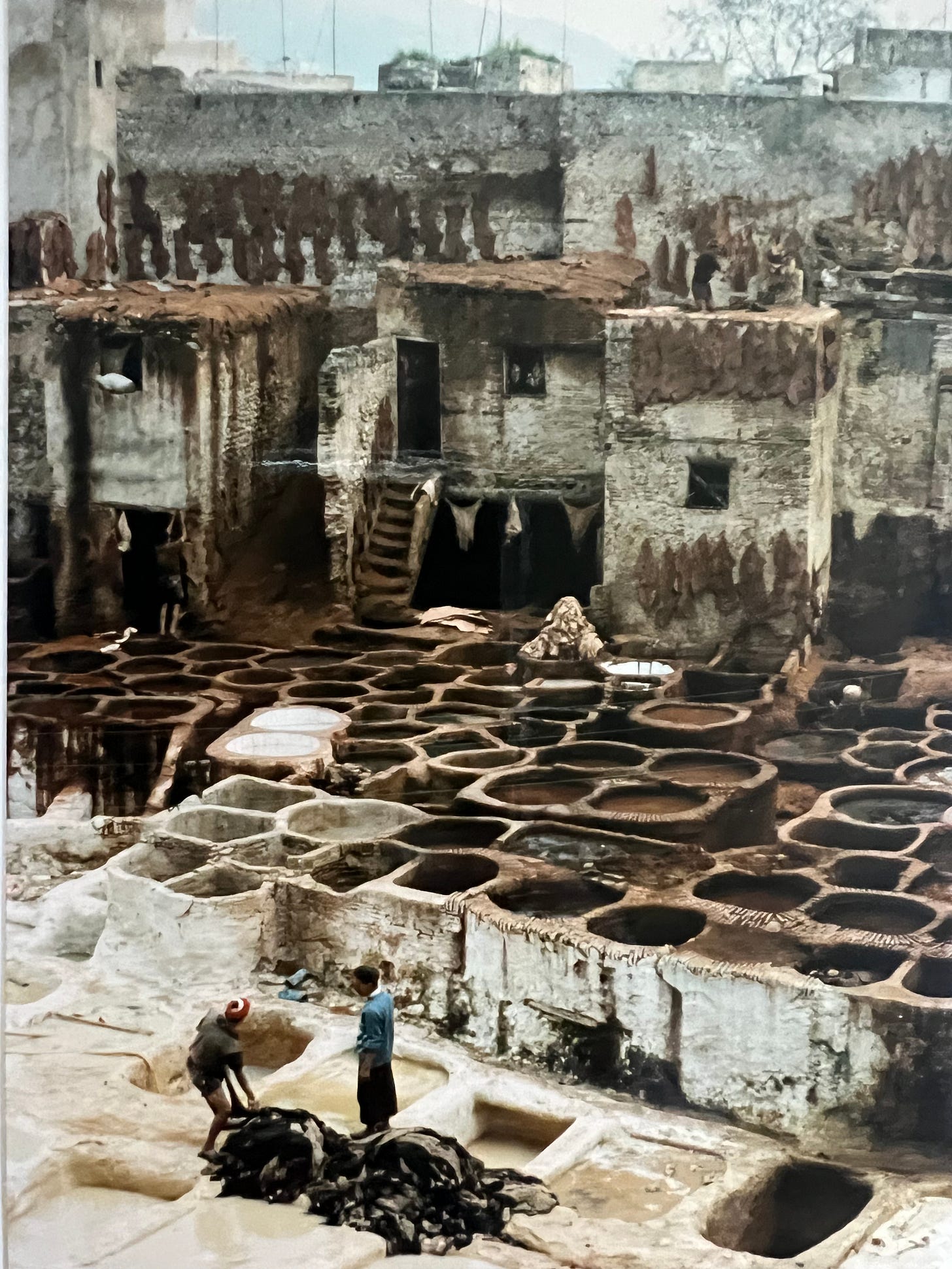
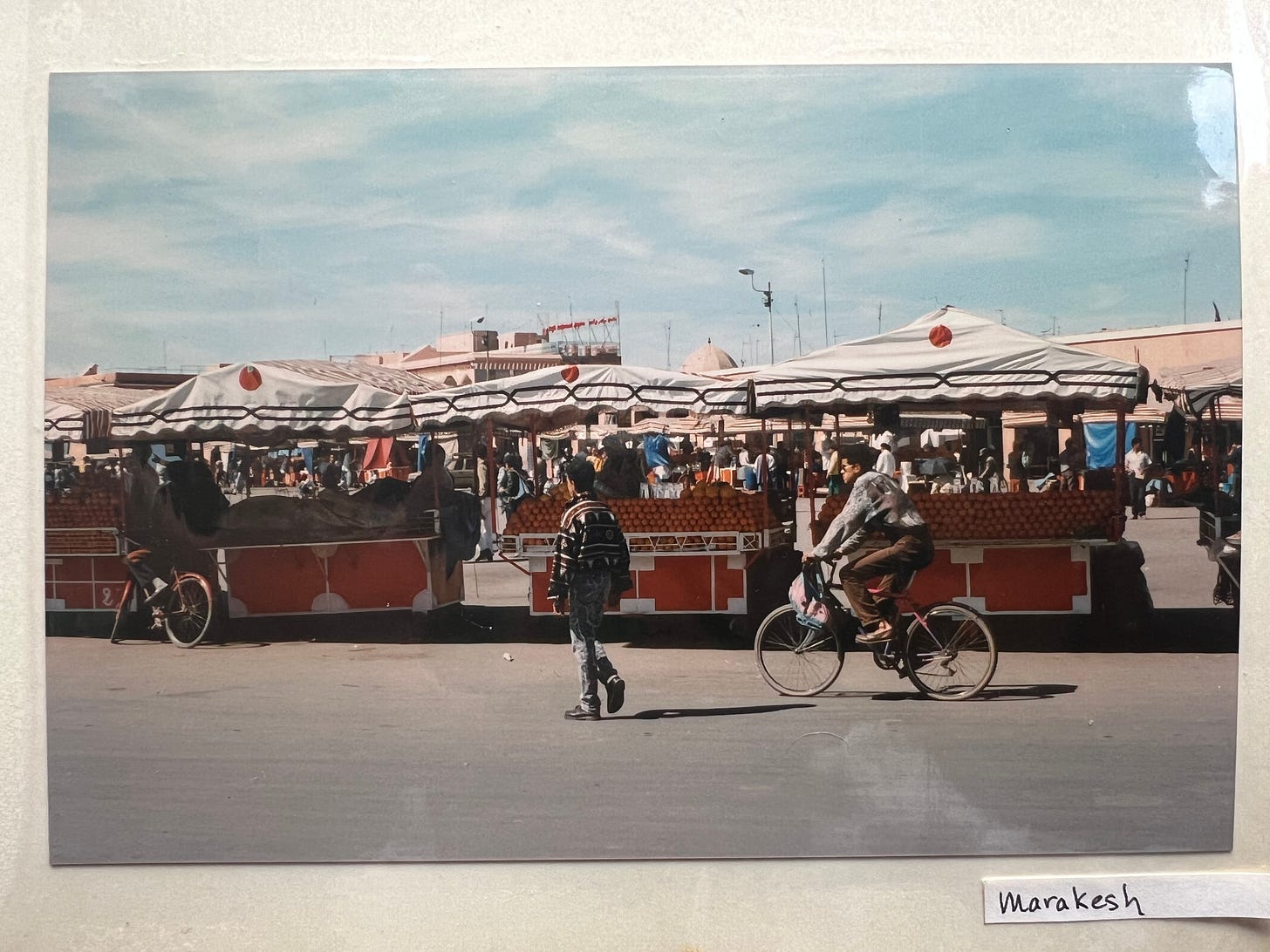

Beautiful writing Jessica. Lots of wonderful descriptions of scents and the worlds you discovered in Morocco and Spain in 1996
Jessica,
This is an incredible story that you have never told me before. Maybe that is for the better. I am glad you had these travels and have such good memories of them.
It is interesting how our memories select some things from our travels for "safe" storage. I suspect you are correct that they involve multiple senses.
Thanks for sharing.